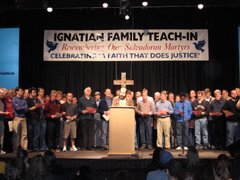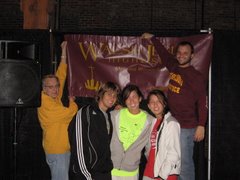
El Salvador Inaugurates its First Leftist Government
On June 1 2009, Mauricio Funes and Salvador Sanchez Cerén were sworn in as the President and Vice President of El Salvador at the Feria Internacional Convention Center in San Salvador. It was a magical day for the Salvadoran people, social movement organizations, and the leftist FMLN party which Funes and Sanchez Cerén represent. Check out a video of the celebration here and view pictures of the inauguration here and here.
In a powerful inaugural address, President Funes promised that the change the people asked for with the election of the FMLN “begins now” and is in the hands of the people, not just the individual will of the President. He vowed to work with sectors of the social movement to “create a new national project” based on social inclusion and guided by the forces of hope and optimism.
Several steps that he and cabinet members, who were sworn in immediately following the ceremony, will take to confront the deep economic and social crisis in El Salvador include an employment program to build over 25,000 new houses, a central bank to guarantee credit to small-scale agricultural producers, and the re-imagination of the Rural Community Solidarity Network to guarantee access to health, nutrition and free public education for the most vulnerable sectors of society.
The address was imbued with the themes of social justice, equality, and of a “peaceful and democratic revolution.” He stated that El Salvador would no longer have a “government of the few, of the privileged” but one where all people would be “recognized for their talents and honesty, not for their connections or their last name.” He spoke of his teacher and mentor, Monsenor Oscar Arnulfo Romero, whose tomb he visited the morning of the inauguration and whose vision of a “preferential option for the poor” was a pillar in Funes’ discourse during the campaign.

